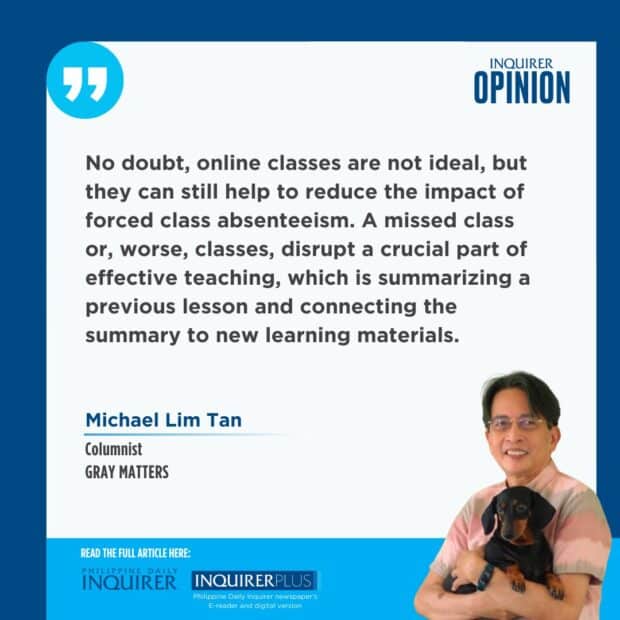Absent

In not too ancient times, we learned if classes were suspended by listening to the radio or television for announcements of Typhoon Signal No. 2 or higher. It was the intensity of the typhoon that determined the suspension.
These days, it doesn’t matter how strong the typhoon is, or if there is even a typhoon. The key is the rains, and the possibility of flooding, which can occur even with mild typhoons, or with just plain monsoon, usually the habagat or the southwest winds bringing in rains.
My children and I now compete with each other when it comes to getting the announcements through one of many “walang pasok” (no classes) online posts of the larger newspapers and broadcasting networks, issued by local government executives and/or officials of the Department of Education, which can happen as early as midnight, several hours before the school day starts, lest parents complain about late announcements.
Article continues after this advertisementTo some extent, the announcements reflect improvements in disaster mitigation, mainly the possibility of students and teachers getting stuck in floods. But I’ve written about how we have become mainly reactive to weather threats, even shifting the academic calendar back and forth to avoid the heat waves, and then the rains, but doing little to address the causes of the heat waves and of the flash floods.
What’s worse is that the frequent class suspensions now constitute another disaster: the adverse consequences that come with learning losses. We all know about how the Philippines’ academic performance scores have been scraping the bottom ranks in the Programme for International Student Assessment (Pisa) but less is said about how that dismal performance comes with our being top-notchers when it comes to class absenteeism, the frequency of missing classes.
The whole world did reel from class absenteeism during the COVID pandemic, with lingering consequences but the pandemic has ended and now we have frequent class suspensions without alternatives, imposing a blanket suspension on all classes. Some of the more forward-looking local governments now specifically announce “face-to-face classes are suspended,” leaving open the possibility of online classes.
Article continues after this advertisementPrivate schools have been quick to switch to online classes. Imagine my delight the first time this happened, when I gently knocked on the bedroom door of one of the kids to tell them “walang pasok.” The room was lit so I figured they hadn’t seen the announcement on their laptops but it turned out they were up and about preparing for classes, because their school had sent an announcement that online classes would be held.
Contrast that with my recent experience with a college online class at the University of the Philippines. Half an hour after the class was supposed to have started, I was still waiting, with a handful of students, to reach a “quorum.” A student finally gave her explanation for the missing students: UP had announced that classes were suspended, but without specifying if online classes were allowed. During that last disaster of Tropical Storm “Enteng” and the monsoon, I lost two classes, out of 16 allocated for the semester.
I’ve come to dread the first semester’s many “walang pasok” announcements because it makes it so much more difficult to catch up with lessons, including the loss of “vuelo,” the Filipino word we borrowed from Spanish which means to take flight and now refers to the momentum to start something, literally to take off as in a flight. Even worse, we might be able to recover momentum with two or three sessions after a suspension, only to be hit by another one or two “walang pasok.” Crash landing!
No doubt, online classes are not ideal, but they can still help to reduce the impact of forced class absenteeism. A missed class or, worse, classes, disrupts a crucial part of effective teaching, which is summarizing a previous lesson and connecting the summary to new learning materials. Remember we are dealing with a generation that grew up on binging episodes on streaming media. Well, not just the young ones but we older ones, too. I sometimes have to replay an old episode that I already watched two or three weeks before or I’m unable to understand what the new one is all about.
Good luck, too, with make-up classes or announcements, which students find even more of an ordeal requiring more work, and extra effort to figure out the subject matter, especially if the instructor just breezes through the materials that were supposed to have been discussed when classes were suspended.
Absence, it is said, makes the heart grow fonder. Alas, when it comes to learning, you need presence, lest “walang pasok” becomes “nothing entered” into the brain.
—————-
mtan@inquirer.com.ph
















